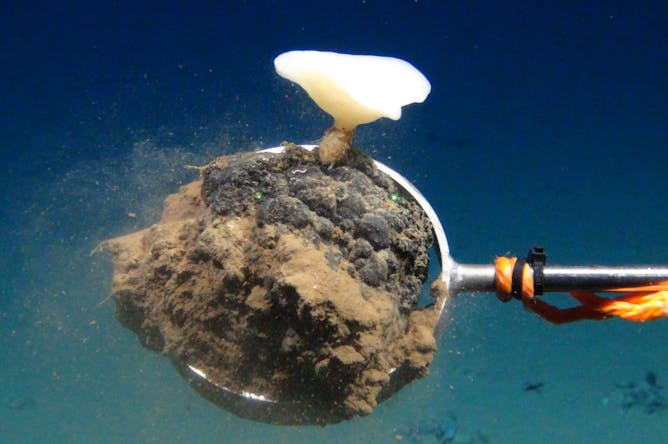|
A police raid at an unexpected location – an oncology clinic in Palermo, Sicily – led to the detention of a mafia boss who was on the run for 30 years. Matteo Messina Denaro was wanted for a litany of violent crimes and was very much considered part of the old school Cosa Nostra. He and others engaged in an out-and-out war with the Italian state in the early 1990s so finding him was a major coup for law enforcement.
However, as organised crime expert Felia Allum points out, the fact that Denaro was in Sicily when he was located does raise questions about why he couldn’t have been tracked down before now. There is even potential significance in the precise date he was detained. Both these clues suggest that although Denaro may go down, his crime syndicate is hardly likely to have been defeated.
Deep below the ocean surface between Mexico and Hawaii, the seafloor is littered with what look like cobblestones. But these are no ordinary rocks. They’re made up of rare earth metals that are essential for today’s EV batteries and many clean energy technologies – metals that are in limited supply.
The rising demand for these metals has set off a rush of interest in seabed mining and a fierce debate over whether it should be banned. Four Indiana University scholars explain the uproar, the history and the potential for both environmental damage and economic windfall.
|

Felia Allum, University of Bath
The mafia boss is the last known face of the Cosa Nostra crime syndicate. But his capture represents the end of an era, not the end of the mafia in Sicily.
|

Scott Shackelford, Indiana University; Christiana Ochoa, Indiana University; David Bosco, Indiana University; Kerry Krutilla, Indiana University
Mining nodules from the deep ocean seabed could provide the metals crucial for today’s EV batteries and renewable energy technology, but little is known about the harm it could cause.
|
|
|
-
Chrystal Zhang, RMIT University
A tragic plane crash has claimed at least 68 lives in Nepal – the latest in a string of aviation disasters in a country grappling with improving the safety of its flight industry.
-
Fatima Fall Niang, Université Gaston Berger
Nigerians and Ghanaians have all claimed authorship of Jollof rice. But in our book, we point out that the “senegality” of this dish is established by the reference to “Jolof”.
-
Samuel Cohn, University of Glasgow; Philip Slavin, University of Stirling
Recent research suggests rats may not have played the critical role in keeping plague going in Europe.
-
Matt Parker, University of Surrey
Why an exploding aquarium in Berlin should destroy prevailing myths about the inner lives of fish.
-
Chengsheng Wu, University of California, San Diego; David Cheresh, University of California, San Diego; Sara Weis, University of California, San Diego
Some cancers are notoriously resistant to chemotherapy and not curable with surgery. Stopping tumors from adapting to the harsh microenvironments of the body could be a potential treatment avenue.
-
Nir Kshetri, University of North Carolina – Greensboro
School officials are becoming increasingly wary of TikTok amid concerns that the app poses a risk to student safety and privacy and makes the nation vulnerable to spies.
|
|

Adrian Winckles, Anglia Ruskin University; Andrew Moore, Anglia Ruskin University
How to know if your computers are infected for use in a distributed denial of service attack.
|